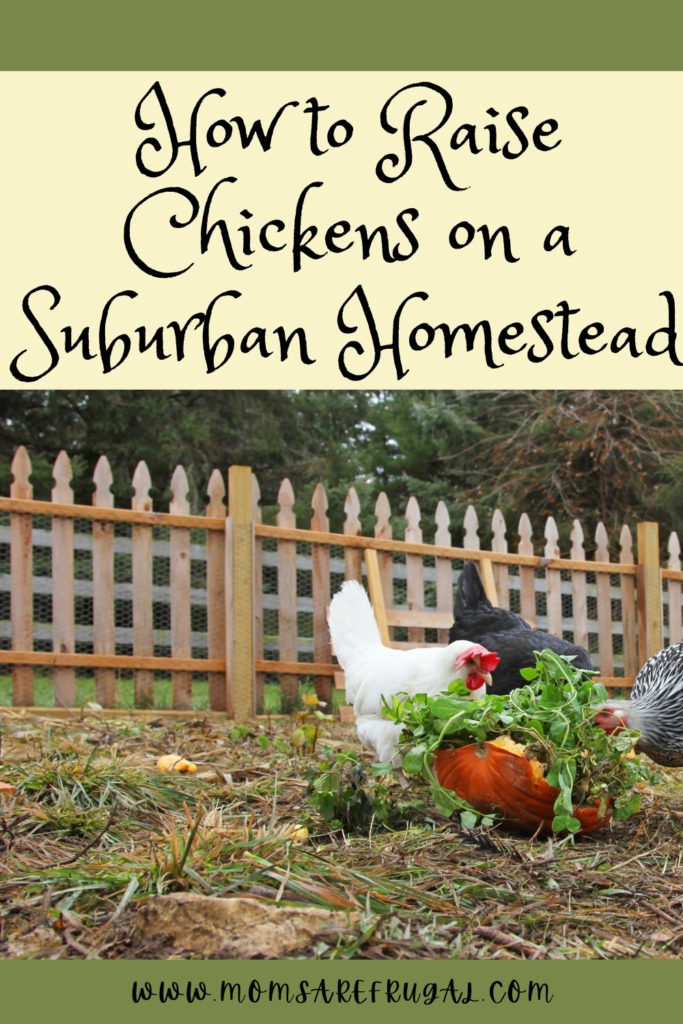We have been raising chickens on our suburban homestead for 14 years. There has been much trial and error, but isn’t there always. Our chickens become wonderful pets that give us eggs. Our family is provided with the best, healthiest eggs possible because of our determination to figure out how to care for these wonderful creatures. Of course, it really isn’t hard once you protect them from predators.
For us, learning how to secure the coop from any predator was the hardest part of keeping them alive. In our first five year’s of owning and trying to raise chickens we quickly found out we do have predators in the suburbia. Raccoon, opossums, minks and other animals pose a threat to chickens. Once we mastered the predator situation and what to look for, the rest hasn’t been hard.
Here are some steps to take from our personal journey:
Local Regulations to Check
Check your local city, state and neighborhood regulations. I know that if you live in an HOA it is against the rules to own animals like chickens. Some cities and towns allow them, but have a cap on the number. Therefore, when looking for chickens I would highly suggest to research, and don’t get a rooster. Roosters’ can be very loud early in the morning. If you do get one have a barn with a door that shuts so it isn’t as loud.
Local regulations in every state are different and may prohibit your ability to raise chickens. We do love our chickens and have found them to be the easiest animal to care for daily.
Choose the Right Breed
Next, in conjunction with the local regulations it it’s important to get a more quiet, less noisy breed of chickens. Depending on the breed and your egg needs, as some are more vocal than other’s. Roosters can be very noisy. I have not had a rooster since I was a child, and from that experience I would recommend not getting one.
Our favorite chickens to raise is the Barred Rock, Rhode Island Red, and Leghorn. The produce eggs and are also good pets.
Buy or Build a Coop
In addition to regulations and breeds the next step is to obtain a coop. It is impossible to raise chickens without a coop. Even though you live on a suburban homestead it is very possible to have predators’. As I mentioned previously this happened to us. We had no idea that a mink could live anywhere near us. But one did. They are sneaky, fast and destructive. We thought we had a secure coop, the mink found a hole and wiggled in. This mink ate all of our baby chicks, in broad daylight.
Likewise it is worth mentioning again to secure your coop everywhere. As you feed and water the chickens each week keep a close eye out on the run. Fill any holes that may be showing, or repair weak spots. Our chicken run is protected from hawks with a netting on the top. Until recently we didn’t know hawks would try to get our chickens. It is very important to think of all predators and protect your chickens.
Clean the Coop and Care for Them in Extreme Conditions
When you raise chickens it is imperative to pay attention to the weather. Really hot weather or extreme cold weather can kill them or make them sick. They don’t need much, but it is necessary to see if they are struggling in the heat. Keep small bowls of water out for them to step in. Or, if it is extremely cold then we add extra straw, a high place in the coop to nest, a warming lamp (safely secured) on a timer, and protection from the wind.
Caring for chickens will also affect your egg production. If they are stressed from weather conditions you might have in interruption in your daily egg count.
Collect Eggs Daily When You Raise Chickens
Every day collect eggs when you raise chickens. Eggs crack, get muddy, interest mice, and many other things if you don’t collect them daily. It is easier to wash and maintain a few rather than a basketful of dirty eggs.
Eggs also go bad if you don’t collect them daily. Anyway, that’s why you chose to raise them for eggs right? Don’t let money be wasted.
After everything that I have spoken about, chickens are a wonderful and easy pet to keep. Feed them food scraps and you don’t have to wasted food.
They are the next closest ancestor to a dinosaur. They eat meat, and other leftovers.
Feed them leftover pumpkins at Halloween, and all of your families scraps to keep the costs down on layer feed. Our suburban homestead has been raising chickens for almost 13 years’ now, and we love raising them.
For more frugal homesteading tips sign up for my newsletter! Also, find me on Instagram @momsarefrugal.








Leave a Reply